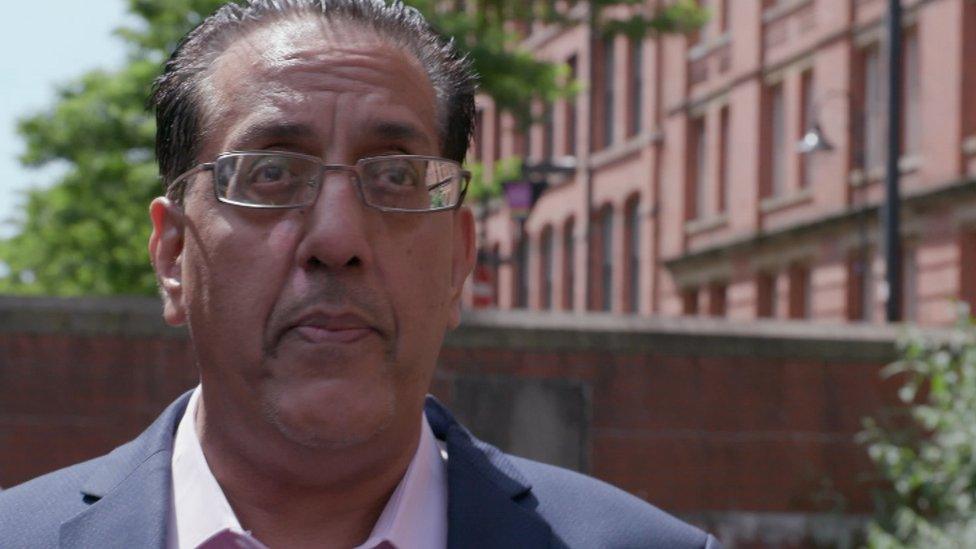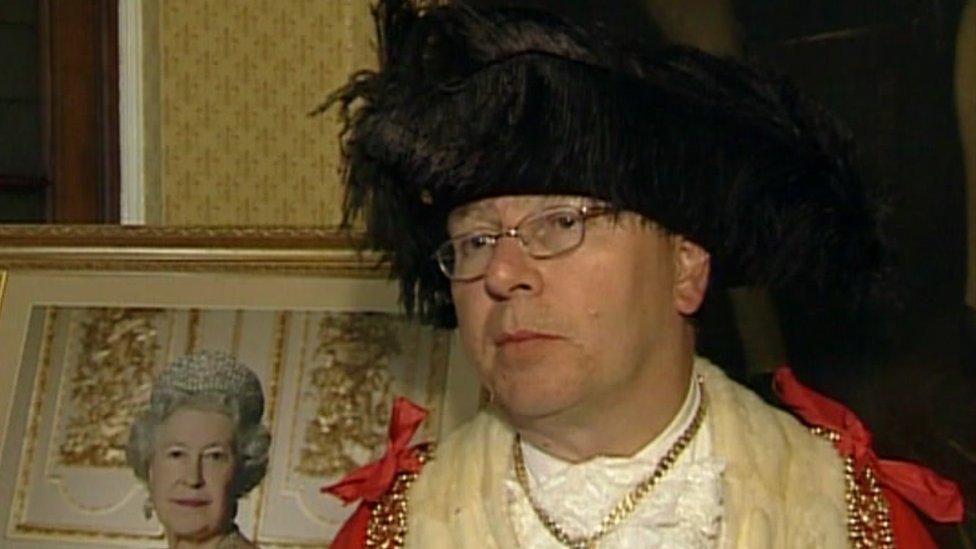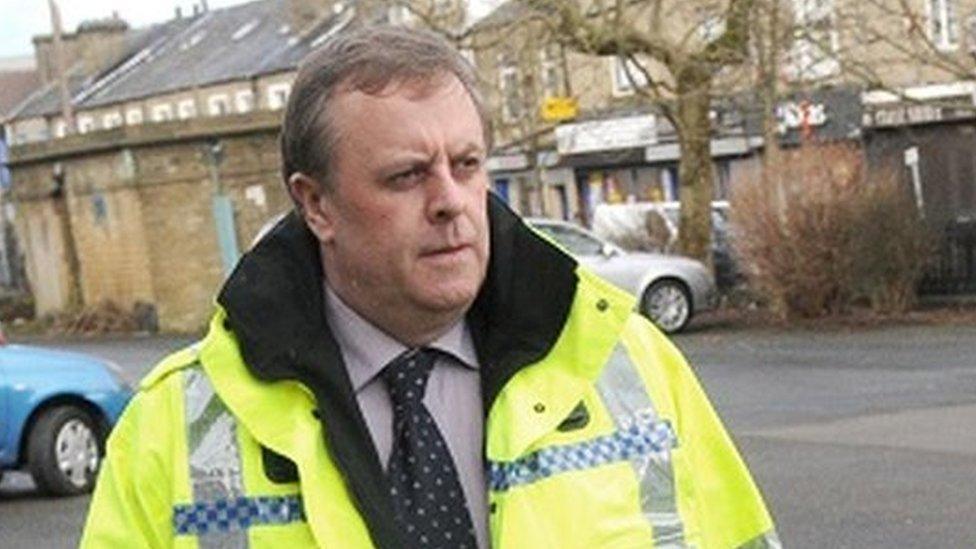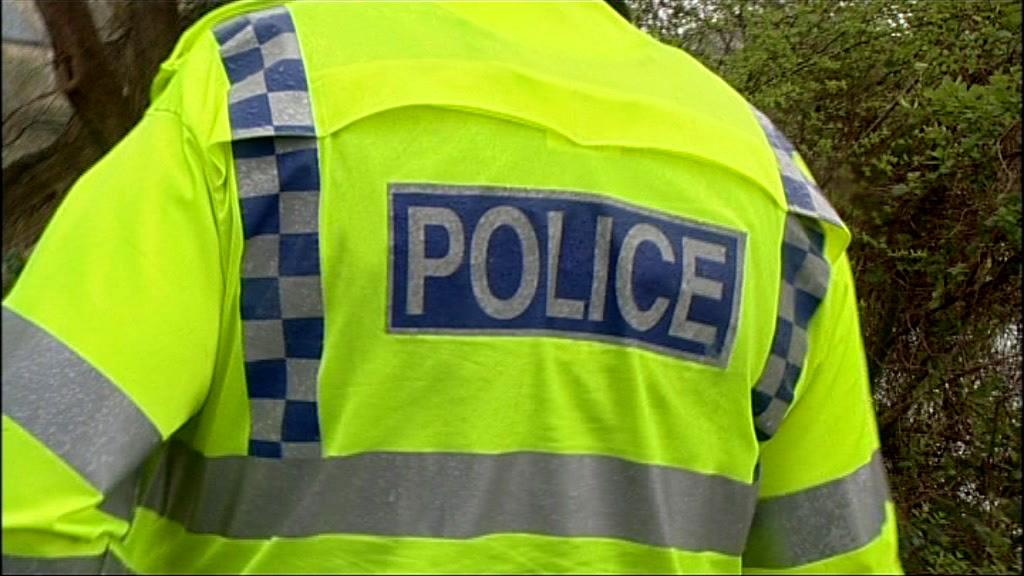Sex offender's hard drive in police commissioner's safe for 14 years
- Published
Mark Burns-Williamson, West Yorkshire Police and Crime Commissioner, said it was an "embarrassing" mistake
A hard drive belonging to a sex offender couldn't be used as evidence against him because it was kept in a police chief's safe for 14 years.
The storage device containing indecent images of children which belonged to ex-Lord Mayor of Leeds Neil Taggart.
But the West Yorkshire Police and Crime Commissioner's (PCC) office did not disclose its existence until after Taggart admitted child sex offences.
PCC Mark Burns-Williamson said he was unaware the images existed until then.
He apologised for the "embarrassing" mistake but added: "There's been no intentional cover-up with this."
An employee at the PCC's office, who had previously been employed by the West Yorkshire Police Authority, remembered the storage device on 6 June 2017.
Taggart, who was a former police authority chairman, was jailed in July 2017 for making and distributing indecent photographs of children.
When officers had searched his home in September 2016 they discovered 36,003 indecent images and videos of children on his computer equipment.
A police whistleblower flagged up the hard drive's existence to the BBC in September 2017.

Neil Taggart was the Lord Mayor of Leeds in 2003
The BBC has learned that when Taggart left the police authority in May 2003 his hard drive was "retained and stored".
Mr Burns-Williamson, who became the authority's chairman a month later, said: "I think it was within a secure safe within the police authority.
"That transferred over to the Police and Crime Commissioner's office but, certainly, I was not aware that it existed.
"Subsequently some images have been found on there, much later on, of course, and I can only assume he [Taggart] knew full well that was the case, and that's why he asked for it to be stored.
"Of course, I'm sorry and I absolutely regret the fact that this hard drive existed and wasn't discovered until 2017."
'Seems suspicious'
The whistleblower said: "I can't think of any reason why they would have kept the hard drive. It was expensive equipment.
"On a high-profile investigation for very serious offences of child sexual imagery, why have they not brought it forward?
"I don't know if he [Mr Burns-Williamson] withheld evidence, but given that it took so long to disclose this evidence, it does seem suspicious."
Mr Burns-Williamson said: "As soon as the member of staff recalled that something had been stored, West Yorkshire Police were immediately notified.
"I was notified on the same day, and I was as shocked as anyone that that was the case.
"It's embarrassing, yes. There have been errors made, so, yes, I absolutely do apologise for that."

Nazir Afzal, former Association of Police and Crime Commissioners chief executive, said questions needed to be asked
The former Chief Crown Prosecutor for the North West of England and former Association of Police and Crime Commissioners chief executive, Nazir Afzal, said it was "staggering" the PCC did not know the hard drive was in a safe in his office.
"This particular individual [Taggart] was extraordinarily high profile. He was the head of the [police] authority.
"They had that material apparently in the office from 2003, going back 14 years, before the sentencing hearing. Why suddenly did they think it was relevant to bring it forward two days after he pleaded guilty?
"We're talking about serious criminal material. The abuse of children, digital or video, is the abuse of children.
"It's not an image. It's a child being abused in real time.
"If that material is sat somewhere for the best part of 14 years questions need to be asked."
Following a Freedom of Information request to the Crown Prosecution Service (CPS), the BBC has learned the CPS was made aware of the existence of Taggart's hard drive on 13 June 2017.
The CPS said it did not form part of the evidence in Taggart's case because he had pleaded guilty a week earlier to the existing indictment and was awaiting sentence.
The hard drive was examined by the police and was found to contain six images - four unique images and two duplicates.
The CPS decided on 28 September 2018 not to charge Taggart with any offences relating to the four indecent images.
A spokesperson said: "These images were of a level of seriousness that had already been reflected within the charges that he had previously been convicted of and would not in our assessment have altered the sentence that the judge imposed."

Police found six images on Neil Taggart's hard drive
The former chief executive of the Child Exploitation and Online Protection Centre, Jim Gamble, called for an independent review of the case.
"There needs to be a fundamentally independent review of... the circumstances surrounding the retention of this hard drive in the first instance, the issues around the delay in it being provided to the police, and ultimately the approach the police took in the investigation of the hard drive - what steps they took to identify, locate and safeguard who may have been in them, or young adults who are now suffering."
West Yorkshire Police said the four images had been investigated by its Victim Identification Officer but there was insufficient information to identify the children.
Taggart died in December 2019.
Mr Burns-Williamson said he would stand for re-election as West Yorkshire PCC when polling takes place in May.
The role of West Yorkshire PCC could be phased out in the next few years.
In Wednesday's Budget, Chancellor Rishi Sunak announced a devolution deal for West Yorkshire, part of which could see policing powers transferred to a West Yorkshire mayor from 2024.
How the BBC researched the story
Between October 2017 and January 2018, the BBC submitted three Freedom of Information (FoI) requests to the PCC requesting information about the hard drive.
Those requests were refused on the grounds that a West Yorkshire Police investigation into the matter was ongoing.
The BBC challenged that decision but it was upheld by the Information Commissioner and then the First-Tier Tribunal, the body that hears appeals regarding FoI legislation.
The tribunal judge said: "In our view this strong public interest in protecting law enforcement outweighs any other interests in disclosure."
Mr Burns-Williamson said he had followed "due process".
"There was an ongoing investigation, and reporting restrictions imposed by the judge," he said.
"The CPS had further time to look at that and all the decisions that I've made in relation to that have been upheld by the Information Commissioner's office and the First-tier Tribunal. So at the earliest opportunity, once those processes are out the way I've clearly given a fuller explanation."
The CPS closed the case on 28 September 2018, at which point the PCC could have disclosed the relevant information.
In October 2019, the BBC submitted a fourth FoI request and the PCC provided detailed information to the BBC in December.
- Published4 July 2017

- Published6 May 2016

- Published16 November 2012
